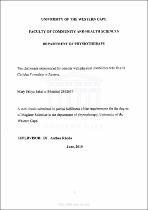| dc.contributor.advisor | Rhoda, Anthea | |
| dc.contributor.author | Sakala, Mary Seliya | |
| dc.date.accessioned | 2023-03-13T07:47:13Z | |
| dc.date.available | 2023-03-13T07:47:13Z | |
| dc.date.issued | 2010 | |
| dc.identifier.uri | http://hdl.handle.net/11394/9745 | |
| dc.description | Magister Scientiae (Physiotherapy) - MSc(Physio) | en_US |
| dc.description.abstract | People with physical disability experience various challenges which include physical, social and attitudinal challenges. These challenges which limit the inclusion of persons with physical disabilities in society are a result of barriers and the physical impairment itself. These factors also cause activity limitations and participation restrictions. Despite the United Nations declaration of 1993 for equalization of opportunities for people with disabilities, not much has changed. It is with this background that the researcher aimed to explore the challenges experienced by people with physical disabilities living in a low cost location of Zambia. Qualitative research methods were employed using a henomenological approach to gain an in-depth insight of these challenges from participants' Iived experiences. Twenty participants were purposively selected for three focus group discussions, and eight of the twenty participants took part in the in depth interviews. The data was organised and analysed using the thematic method. Results of the study showed that participants in this study were challenged with architectural barriers due to designs, they lacked formal education, specialised skills, and most of them were unemployed and financially dependent on others. The negative attitudes of families, service providers, and the community in general resulted in discrimination and limited the participation and involvement of people with disabilities in the mainstream activities. The cultural beliefs of the participants in the research influence the manner in which society perceives persons with disability and treat them. Limited access to information about HIV/AIDS and the myths about the cure of the pandemic makes people with disabilities more venerable and at risk of being infected. The information regarding challenges experienced by people with disabilities gained in the study could be used by the policy makers for implementation of the UN declaration of equalisation of opportunities for people with disabilities. | en_US |
| dc.language.iso | en | en_US |
| dc.publisher | University of the Western Cape | en_US |
| dc.subject | Physical disability | en_US |
| dc.subject | Challenges | en_US |
| dc.subject | Accessibility | en_US |
| dc.subject | Attitudes | en_US |
| dc.subject | Rehabilitation | en_US |
| dc.subject | Services providers | en_US |
| dc.subject | Society | en_US |
| dc.subject | Poverty | en_US |
| dc.subject | Qualitative research Chitubu Township (Zambia) | en_US |
| dc.title | The challenges experienced by persons with physical disabilities who live in Chifubu Township in Zambia. | en_US |
| dc.rights.holder | University of the Western Cape | en_US |

